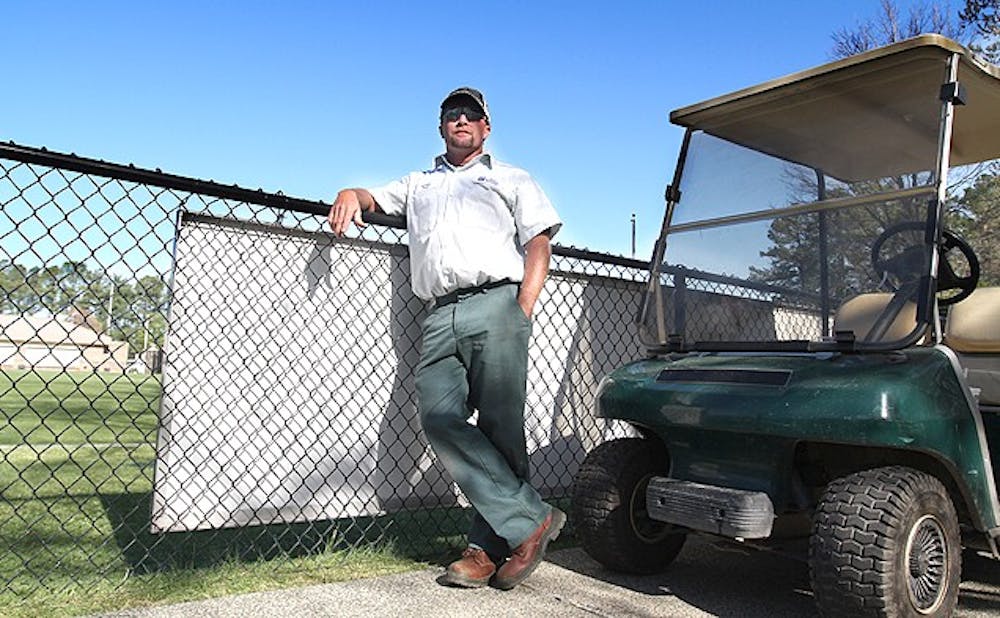Jamie Fuqua means business.
But he bears no relation to Duke’s Fuqua School of Business, which shares his name. People regularly ask the 41-year-old horticultural specialist what he is doing working manual labor with that last name, but for him it is just a coincidence he can laugh about.
“I’ve always been intrigued by that,” he said. “Maybe I’ll have to hunt down that [family] tree and see where it runs me to.”
Coming to Durham directly out of high school with his ex-wife and her mother, both of whom had jobs at the University, Fuqua first began work at Duke as a grounds equipment officer 23 years ago. He has received promotions since then to senior GEO, landscape specialist and now to horticultural specialist, but his job has always centered around the maintenance of the athletic facilities.
Sitting on the bleachers of Koskinen Stadium—a field heavily used in both the fall and spring with soccer and lacrosse, respectively—Fuqua has already been at work for three hours and it is just 10 a.m. No day is an easy one when he has to take out the trash, trim the grass, paint field lines and take care of any number of additional behind-the-scenes tasks that make the athletic facilities pristine.
His job regularly begins at 7 a.m. and often carries over to weekends, but he takes pride in getting to work the outdoors surrounded by activities he loves.
“I’m a sports nut, and I’ve always been a sports nut,” Fuqua said. “I grew up on a tobacco farm. If you put me inside somewhere, I’d probably go nuts.”
With his proximity to the athletic facilities, he holds a unique perspective on their evolution. Fuqua recalls when the locker rooms and bathrooms behind Koskinen did not exist, forcing athletes to use portable toilets. He saw the overhaul of Wilson Gymnasium and the construction of the Schwartz-Butters Building. And where the 70,000 square-foot Yoh Football Center now stands, Fuqua remembers there used to be endless trees.
But he has seen the transformation of people at Duke, too. Fuqua used to see men’s basketball head coach Mike Krzyzewski walk past Card Gymnasium to the Intramural Gymnasium, where he would play racquet ball every morning. He has not seen him do that in a while.
The connections he makes with coaches and athletic programs make the job worthwhile for Fuqua because it rewards his commitment to the University.
“They make you feel appreciated,” he said. “It’s good to hear the feedback from coaches when you’re doing this day-in, day-out.”
One person with whom he became particularly close was Mike Pressler, the former men’s lacrosse coach who lost his job after 16 seasons in the midst of the Duke lacrosse scandal. The pair bonded first with their love of sports but their relationship grew through their love of the outdoors when they began to hunt and fish together.
Quickly, Pressler made Fuqua a part of the team. In 2005, when the Blue Devils made the NCAA semifinals, Fuqua drove a van of players to the game who otherwise would have been left home due to space constraints.
“He was kind of our security guy, our equipment guy and our jack of all trades,” Pressler said.
During fall practice of 2005, Fuqua tattooed the Duke logo on his upper arm with a lacrosse stick in the middle of the “D.” He did not show anybody but Pressler, so when the head coach called him up in front of the team to reveal the ink, it came as a big surprise.
The team “erupted” when Fuqua showed off his tattoo, he said, but it became an even larger rallying cry for the squad when Pressler said he would get a matching one on his chest should the Blue Devils win the national championship.
Unfortunately for the duo, that team never had the chance to win the 2006 title due to the ensuing scandal that forced the cancellation of the season.
The day Pressler announced his resignation, Fuqua could not be there to comfort the head coach because he was experiencing pain of his own—Fuqua watched the news from the emergency room as he prepared to have his appendix taken out.
“Jamie was crushed for his friend, and he was crushed for the team. Part of his life was put up in turmoil,” Pressler said. “Loyalty is measured not when things are going well, but when things aren’t going well. And when the people you are loyal to face adversity, how you react. Without question, Jamie’s true colors showed brightly throughout that period of time.”
Following the scandal, Fuqua regularly visited Pressler, who was still living in Durham at the time. Since then, Fuqua has developed a strong relationship with current men’s lacrosse head coach John Danowski.
As always, Fuqua’s presence can still be recognized by the white pickup truck that he drives when taking care of the fields across campus.
He has spent his entire adult life doing a job at a location with people and landscapes that have constantly been changing. But at the end of the day, Fuqua proudly smiles because nothing satisfies him more than having spent its entirety under the sun.
“A lot of the time people envy you because they’re like, ‘Hey, I wish I had a job where I could sit there, be there for a game and take it all in,’” Fuqua said. “You get paid to do a job, but you get paid to do something that you really like.”
Get The Chronicle straight to your inbox
Signup for our weekly newsletter. Cancel at any time.

